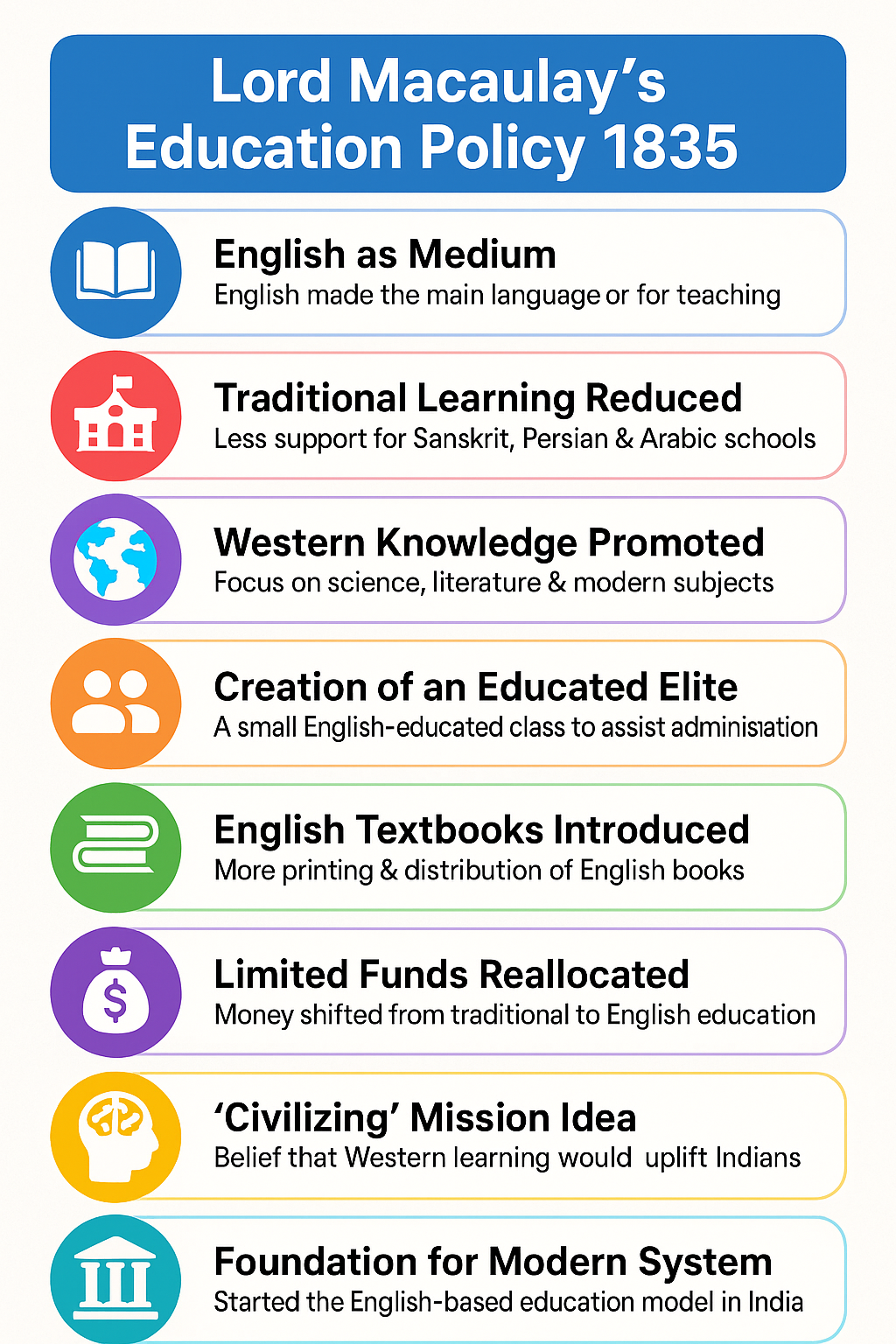Thomas Babington “Lord” Macaulay holds a significant place in India’s colonial history, especially in shaping its education and legal systems. As a British historian, politician, and the first Law Member of the Governor-General’s Council, he strongly advocated for replacing traditional Indian learning with Western, particularly English, models of education.
His influential 1835 Minute on Indian Education and his leadership in drafting the Indian Penal Code helped establish an English-educated urban elite that would guide administration and public life for decades. However, these reforms also pushed aside India’s rich indigenous knowledge traditions, classical languages such as Sanskrit and Persian, and long-standing systems of local schooling. This dual legacy makes Macaulay a complex figure, celebrated by some as a builder of modern institutions and criticised by others as an agent of cultural displacement. Check this article for detailed information about Lord Macaulay.
Who was Lord Macaulay?
Lord Macaulay, whose full name was Thomas Babington Macaulay, was a British writer and leader who played an important role in India during the 1800s. In 1835, he introduced a new law called the English Education Act. His idea was to teach only a small group of Indian students using Western subjects and the English language.
Before this, children in India learned through their own traditional systems, using Indian languages and teachings. But Macaulay wanted to replace this with Western learning. His goal was to create a group of Indians who would think, speak, and behave like the British, while still being Indian by birth.
Because of this policy, many Indians slowly started to believe that Western ideas were better than their own culture. This changed India’s education system for many years.
Lord Macaulay’s English Education Act, 1835
Macaulay recommended that English should be the main medium of instruction in Indian schools and colleges.

-
Shift from Traditional Learning: Funding for Sanskrit, Persian, and Arabic institutions was reduced, marking a move away from traditional Indian education systems.
-
Promotion of Western Knowledge: The policy encouraged teaching Western science, literature, philosophy, and modern subjects instead of classical Indian texts.
-
Creation of an Educated Class: Macaulay aimed to produce a class of Indians educated in English who could assist in administration and act as a link between the British rulers and the Indian population.
-
Support for English Textbooks: He emphasized printing and distributing English books to spread Western ideas more efficiently.
Utilization of Limited Resources: Macaulay argued that government funds should be used to promote English education rather than supporting multiple traditional institutions. -
Moral and Intellectual Justification: He believed English education would “civilize” Indians by exposing them to Western thought, values, and knowledge.
-
Foundation for Modern Education System: His policy became the starting point for the English-based education system that shaped India’s academic structure for decades.
How Macaulay’s 1835 Education Policy Changed Indian Learning?
Lord Macaulay’s English Education Act of 1835 completely changed how students in India were taught. Here are the main points in a easy way:
-
The English Education Act made English the main language for teaching in Indian schools and colleges.
-
Lord Macaulay told the East India Company to stop spending money on printing books in Sanskrit and Arabic.
-
His goal was to create a group of Indians who would think and act like the British, even though they were Indian.
-
Macaulay introduced the Downward Filtration Theory, which meant that only a small group of upper-class students would get Western-style education first.
-
He believed that these educated students would later influence the rest of the people in India.
-
This policy slowly replaced Indian traditional learning with Western ideas and subjects.
Lord Macaulay’s 1835 Education Policy reshaped India’s learning system by replacing traditional knowledge with Western, English-based education. While it introduced modern subjects and administration-ready scholars, it also led to the gradual decline of India’s indigenous educational heritage.
Comments
All Comments (0)
Join the conversation